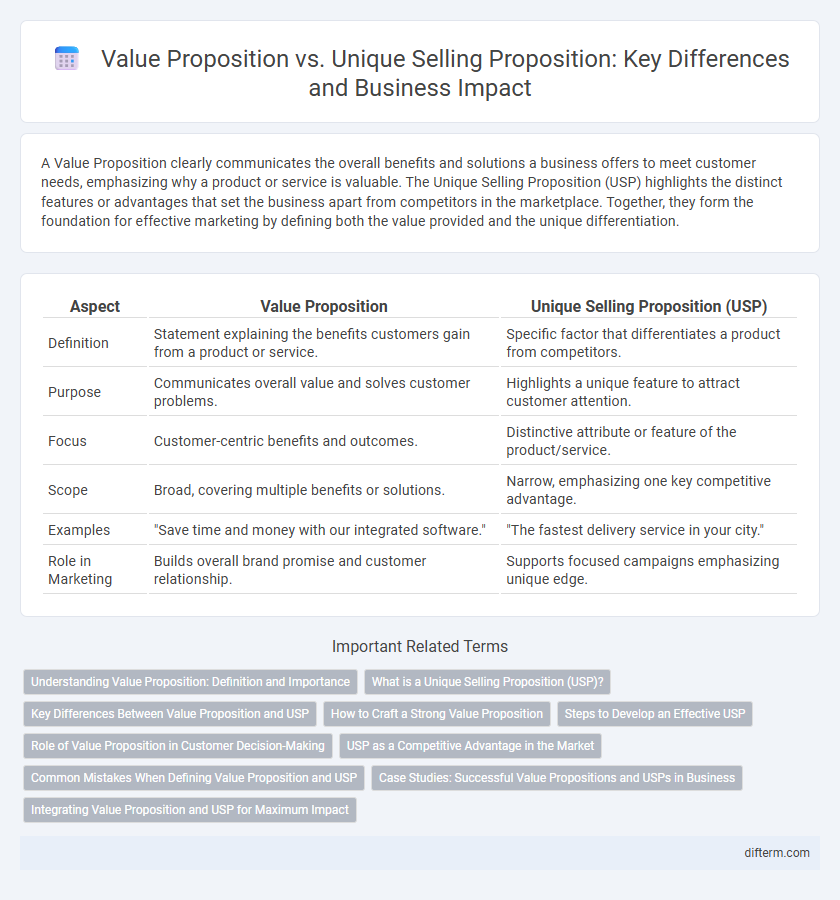A Value Proposition clearly communicates the overall benefits and solutions a business offers to meet customer needs, emphasizing why a product or service is valuable. The Unique Selling Proposition (USP) highlights the distinct features or advantages that set the business apart from competitors in the marketplace. Together, they form the foundation for effective marketing by defining both the value provided and the unique differentiation.
Table of Comparison
| Aspect | Value Proposition | Unique Selling Proposition (USP) |
|---|---|---|
| Definition | Statement explaining the benefits customers gain from a product or service. | Specific factor that differentiates a product from competitors. |
| Purpose | Communicates overall value and solves customer problems. | Highlights a unique feature to attract customer attention. |
| Focus | Customer-centric benefits and outcomes. | Distinctive attribute or feature of the product/service. |
| Scope | Broad, covering multiple benefits or solutions. | Narrow, emphasizing one key competitive advantage. |
| Examples | "Save time and money with our integrated software." | "The fastest delivery service in your city." |
| Role in Marketing | Builds overall brand promise and customer relationship. | Supports focused campaigns emphasizing unique edge. |
Understanding Value Proposition: Definition and Importance
A value proposition is a clear statement that explains how a product or service solves a customer's problem, delivers specific benefits, and why it is better than competing alternatives. It communicates the unique value a business offers to its target audience, driving customer acquisition and retention. Understanding the value proposition is crucial for aligning marketing strategies and product development with customer needs and expectations.
What is a Unique Selling Proposition (USP)?
A Unique Selling Proposition (USP) is a distinct feature or benefit that sets a business apart from competitors, addressing specific customer needs or desires. It highlights why a product or service is superior and encourages customer preference. Companies leverage their USP to create a strong market identity and drive targeted marketing strategies.
Key Differences Between Value Proposition and USP
Value Proposition emphasizes the comprehensive benefits and value a product or service delivers to customers, addressing their needs and pain points. Unique Selling Proposition (USP) highlights the distinct feature or advantage that sets a product or brand apart from competitors in the market. While the Value Proposition communicates overall customer value, the USP focuses on the single differentiator driving customer choice.
How to Craft a Strong Value Proposition
Craft a strong value proposition by clearly identifying the specific customer needs your product or service addresses and highlighting the unique benefits that distinguish your offering from competitors. Emphasize measurable results such as cost savings, increased efficiency, or enhanced customer satisfaction to create compelling, value-driven messaging. Ensure the proposition is concise, customer-focused, and validated through market research to effectively resonate with your target audience.
Steps to Develop an Effective USP
Defining a Unique Selling Proposition (USP) starts with identifying target customer needs and analyzing competitor offerings to ensure differentiation. Crafting a clear, compelling message that highlights specific benefits or features which address customer pain points strengthens brand positioning. Testing and refining the USP based on market feedback ensures relevance, credibility, and maximum impact in driving customer preference.
Role of Value Proposition in Customer Decision-Making
The value proposition communicates the core benefits and solutions a product or service delivers, directly addressing customer needs and pain points. It shapes customer perception by highlighting how the offering improves their situation, influencing their decision-making process more effectively than a simple unique selling proposition. Understanding and clearly articulating the value proposition enhances customer trust and drives purchasing decisions by emphasizing tangible value over mere differentiation.
USP as a Competitive Advantage in the Market
A Unique Selling Proposition (USP) serves as a critical competitive advantage by clearly defining what sets a business apart in the market, emphasizing distinct benefits that competitors cannot easily replicate. Unlike a Value Proposition, which outlines the overall value and solutions a business offers to customers, the USP zeroes in on a singular, compelling factor that drives customer preference and loyalty. Businesses leveraging a strong USP can effectively differentiate themselves, attract target audiences, and command premium pricing in competitive marketplaces.
Common Mistakes When Defining Value Proposition and USP
Common mistakes when defining a Value Proposition include being too vague or focusing solely on product features rather than customer benefits, leading to weak market differentiation. For Unique Selling Proposition, companies often confuse uniqueness with superiority, failing to communicate what truly sets their offering apart from competitors. Overlooking customer perspective and market relevance in both concepts undermines their effectiveness in driving business growth and competitive advantage.
Case Studies: Successful Value Propositions and USPs in Business
Case studies reveal that successful value propositions clearly articulate customer benefits, such as Dollar Shave Club's emphasis on convenience and affordability disrupting the razor market. Unique Selling Propositions often highlight distinct product features or innovations, as seen in Tesla's focus on electric vehicle performance and sustainability. Businesses leveraging compelling value propositions and USPs demonstrate increased market differentiation and customer loyalty, driving sustained growth and competitive advantage.
Integrating Value Proposition and USP for Maximum Impact
Integrating a Value Proposition with a Unique Selling Proposition (USP) maximizes business impact by clearly communicating both the overall value and distinct advantages of a product or service. A well-defined Value Proposition highlights the benefits customers gain, while the USP emphasizes what sets the offering apart from competitors. Combining these elements ensures targeted messaging that drives customer engagement and boosts conversion rates.
Value Proposition vs Unique Selling Proposition Infographic

 difterm.com
difterm.com